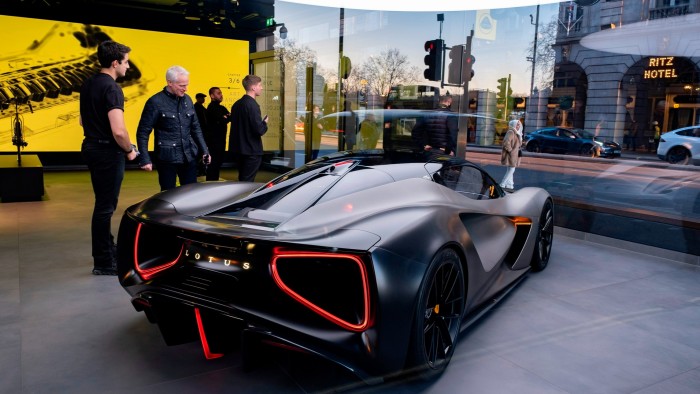Wealthy investors weather the inflation storms

Roula Khalaf, Editor of the FT, selects her favourite stories in this weekly newsletter.
Inflationary shocks have reverberated around the globe over the past three years — but the world’s wealthy have largely weathered them, say private bankers and investment managers.
Despite a sustained period of higher outgoings — with headline annual inflation still at 3.5 per cent in the US and 2.4 per cent in the eurozone after hitting multi-decade highs two years ago — the world’s billionaires and ultra rich have grown wealthier, according to US media group Forbes.
Industry figures say the rich have shielded their wealth from inflation by investing in the tech-driven stock boom, which has outpaced the rise in the cost of living, and by making smart bets on private equity, debt and infrastructure that have delivered strong returns.
“Wealthy individuals and their families are sophisticated investors, like hedge funds, that have been part of the stock market rally,” says Hannes Hofmann, global head of the family office group at Citi Private Bank.
“They were affected by the cost of living crisis, but many of the big family offices that manage the wealth of the rich have invested wisely in stocks, bonds and private equity.”
The wealthy continued to spend despite inflation being higher for goods and services that are largely bought or used by the rich compared with broader consumer prices.

Forbes’ annual cost of living extremely well index (CLEWI) — which tracks spending on items such as opera tickets, exclusive school fees, and luxury cars — rose higher than US consumer prices last year.
The CLEWI climbed 4.9 per cent in 2023 — above the 3.4 per cent rise in US CPI in the same period — following increases of 7 per cent in 2022 and 10.1 per cent in 2021.
Yet this failed to halt the rise in total wealth among the world’s richest people. Forbes’ worldwide billionaire index, published in April, showed that the total wealth of the richest people around the globe had risen to a record $14.2tn in 2024 — a 14 per cent increase on the $12.2tn recorded at the same point in the previous year.
The richest 400 people in the US also saw their wealth jump significantly higher than inflation in 2023, with the average net worth of the Forbes 400 wealthiest Americans up 13 per cent, to $11.3bn, year on year.
“Ultra high net worth individuals are not that exposed to inflation as their portfolios are usually well diversified,” explains Alessandro Caironi, head of banking, lending & investment solutions at Deutsche Bank Private Bank. “They hold investments such as public and private equity and real estate that protect them.”
Rebecca Gooch, global head of insights at Deloitte Private, a division of the Big Four consultancy group, adds: “With inflation showing signs of moderation, it is no longer the number one worry for the wealthy. They are now more concerned about geopolitics [with wars in the Middle East and Ukraine] and global economic uncertainty.”

Still, despite the sharp slowing of inflation from peaks of 9.1 per cent in the US and 10.6 in the eurozone in 2022, it remains a threat to investment portfolios.
“We are facing the last hurdle in the killing of inflation, particularly in the US,” says Matthew Morgan, head of fixed income at Jupiter Asset Management. “The big question is how quickly will the Fed tame inflation.”
Morgan thinks the US Federal Reserve will probably pave the way to a soft landing for America and the world economy, but adds that there are risks of a crash in the event of increasing geopolitical instability.
“To what extent is the increase in inflation temporary?” asks John Stopford, head of multi-asset income at investment group Ninety One. “Is it a response to the pandemic? Or will there be a lasting impact?”
For wealthy investors, despite the receding threat of inflation, there is still a need to diversify, stresses John Roe, head of multi-asset funds at Legal & General Investment Management.
“Inflation can mislead people to think equity markets are doing better than they are. If inflation is rising at 3 or 4 per cent, then stocks must rise more than that or the real capital appreciation is flat.”

“Diversification absolutely matters,” agrees Mark Haefele, chief investment officer of UBS Global Wealth Management. “You need to diversify geographically and across asset classes.”
Yet, investment managers and strategists remain confident the rich can continue to expand their wealth as they buy assets in private markets that deliver strong returns despite higher inflation. They also expect public equity markets to carry on rising as they hit fresh highs and increase the value of portfolios.
“The changing macro environment has created new investment opportunities,” says Charles Jewkes, head of global wealth at Aviva Investors. “Private markets can be attractive in a higher interest rate and inflationary environment.”
Grace Peters, global head of investment strategy at JPMorgan Private Bank, adds: “We believe the rally in the US equity markets is sustainable, based on the improving fundamental economic picture globally. Over time, we think US equities should continue on their upward path to drive healthy returns.”
Comments